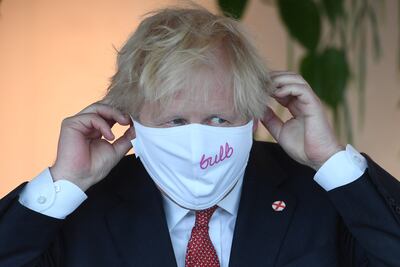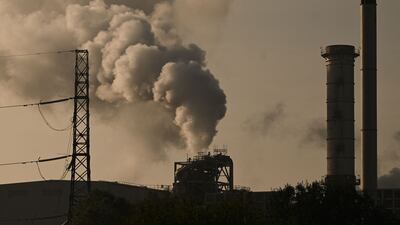Britain’s energy watchdog has warned the gas crisis will not be short-lived, with more companies expected to collapse.
Shortly after that warning energy provider Green and Avro Energy became the latest victims of the crisis.
Green blamed “unprecedented market conditions and regulatory failings” for its collapse on Wednesday.
Ofgem said that it would ensure that Avro’s 580,000 domestic gas and electricity customers, and Green’s 255,000 households would be protected.
The regulator will choose a new supplier for the households, and said customers should wait to be contacted by their new supplier.
Another firm, Igloo, revealed it was facing mounting pressure, and the UK's sixth-largest energy company, Bulb, which has 1.7 million customers, is seeking new financing and potentially a government bailout.
On Wednesday, Jonathan Brearley, the head of Britain's Ofgem energy regulator, told the House of Commons business select committee that the recent rise in gas prices was unprecedented and more energy suppliers could go out of business.
“Have a look at the change in the gas price - it really is something that we don't think we've seen before at this pace,” he said.
“We do expect more [suppliers] not to be able to face the circumstances we're in.”
Emma Pinchbeck, chief executive of supplier trade body Energy UK, said the government and Ofgem were warned two years ago that the energy sector was fragile.
“I took this job a year ago. When I was hired, the chairman of Energy UK said that your biggest challenge is going to be the vulnerability of the retail market,” she said on Wednesday.
“I know that for a year or more before that my team have been making the case to the regulator and the government that the sector is fragile.”
Business Secretary Kwasi Kwarteng said preparations were being made for gas prices to remain high for some time, despite Boris Johnson describing the problem as “temporary”.
He told the committee: “I think ‘temporary’ means that it’s a position where the price has spiked considerably … I think it has quadrupled in the last six months, seven months.
“You would expect normally that the price would revert to the mean, it’s not something that we think is going to be sustainable.
“But, of course, we have to prepare for longer-term high prices.”
Bulb has said it has been hit hard by the escalating wholesale price of gas.
A number of options have been drawn up to offer help to companies at risk of going bust this winter, particularly large businesses whose customers would not be easily absorbed by competitors in the struggling sector.
Nationalisation is “still on the table”, the i newspaper reported, citing sources at the Department of Business, Energy and Industrial Strategy and the Treasury, although the insiders described the plan as a “nuclear option”.

Ministers had hoped rival energy groups would take on Bulb’s customers but found that none of the larger companies had the capacity to accept so many at such short notice.
The government then had to devise alternative options to keep Bulb afloat.
Officials are also preparing to give “tens of millions” of pounds to factories making carbon dioxide.
Under a deal brokered by Business Secretary Kwasi Kwarteng on Tuesday, the government will provide “limited financial support” towards CF Fertilisers’ running costs to help prevent a food supply shortage at Britain’s supermarkets.
The agreement will be in place for three weeks while the “CO2 market adapts” to the surge in global gas prices, the ministry said.
Cabinet minister George Eustice defended the use of “many millions” of pounds of taxpayers’ money being used to prop up the US-owned company.
The Environment Secretary told BBC Radio 4’s Today programme: “It will go to ensuring that two critical plants that produce carbon dioxide which is critical to our food supply chain continue to operate and therefore sectors like the poultry sector, meat processors in poultry and pigs, can get access to the carbon dioxide they need.
“The reason, sometimes, it is justified for the government to intervene in this way, in a very short-term, targeted way, is that if we didn’t, there would be a risk to our food supply chain — that’s not a risk the government is willing to take.”
Mr Eustice touched on the closure of two plants in Teesside and Cheshire, which are run by CF Fertilisers.
The company produces about 60 per cent of the UK’s CO2. Work at both sites was suspended due to the sharp rise in energy costs but operations were expected to return after a deal with the government.
“We’ve intervened to basically support this company with some of their fixed costs on a short-term basis, just for a few weeks, so that we can keep that carbon dioxide supply going and give the market time to adjust and for other supplies to come on stream,” Mr Eustice said.
He said the government would give “possibly tens of millions” of pounds to CF Fertilisers.
The cost of CO2, which is needed for the humane slaughter of some animals, is set to rise further, Mr Eustice said.
Without urgent action a “real animal welfare challenge” and “a big disruption to the supply chain” would ensue, he said.
He said the wholesale price of CO2 could go from about £200 ($273) per tonne to £1,000 per tonne and that the energy sector had found itself in a “perfect storm”.
“The challenge we’ve had is that there is another [CO2] factory in the UK but that’s currently closed for maintenance,” he said. “There’s also another factory that we often get supplies from in Norway that’s also closed for maintenance.
“So we have this perfect storm of two plants closing because they don’t have a market for their fertiliser and because prices have risen and two other plants are currently closed for maintenance.
“Once those plants reopen then we will be back into our properly functioning normal markets.”
Ms Pinchbeck, of Energy UK, said the long-term solution to the energy crisis was to divest from fossil fuels and create more renewable energy.
“I think the long-term solution for this and for getting off of volatile fossil fuel is the pursuit of the net zero strategy that the government are supposed to be outlining this autumn,” she told BBC Radio 4’s Today programme.
Sir John Armitt, chairman of the UK’s national infrastructure commission, said the UK must pursue greener energy options, including wind, solar and tidal energy.
“It’s a balance here between making sure that we can switch the lights on and at the same time can be generally decarbonising as we move forward over the next 20-30 years,” he said.
He said the government’s hydrogen policy can help to create a much cleaner gas that can provide electricity.
Mr Eustice also said the deal to safeguard CO2 supplies would help ensure “Christmas is safe” although the food industry still faces problems.
Poultry industry figures had warned that supplies of turkeys could be hit by a shortage of CO2.
“Christmas is safe, of course. But there are challenges in the food supply chain, I’m not denying that,” Mr Eustice told LBC Radio.
“The lack of labour availability, pressures on logistics — all of these are causing some stresses. It does mean that in some areas the degree of choice in some supermarkets is down slightly on what it would normally be.
“But we are working with the industry to make sure that we get all the food that we need on the shelf for those all-important weeks running up to Christmas.”

